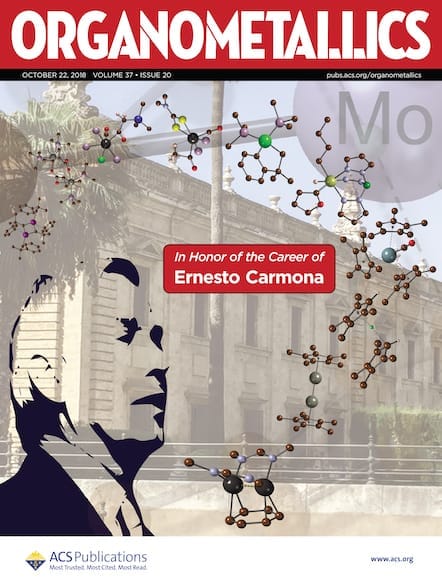The 2019 Organometallics Distinguished Author Award, sponsored by Organometallics, the ACS Division of Organic Chemistry, and the ACS Division of Inorganic Chemistry, recognizes authors who have contributed exceptional papers from 2017-2018. This year’s award recipient is Ian Tonks, a Chemistry Professor at University of Minnesota, Twin Cities. Tonks will receive a plaque, honorarium, and expenses […]

The 2019 Organometallics Distinguished Author Award, sponsored by Organometallics, the ACS Division of Organic Chemistry, and the ACS Division of Inorganic Chemistry, recognizes authors who have contributed exceptional papers from 2017-2018. This year’s award recipient is Ian Tonks, a Chemistry Professor at University of Minnesota, Twin Cities. Tonks will receive a plaque, honorarium, and expenses paid to attend the 258th ACS Fall National Meeting & Exposition in San Diego, where he will receive his award and present the award lecture during a dedicated symposium.
“Ian is being recognized in part for his article on generation of reduced titanium catalysts for alkyne cyclotrimerization,” says Professor Paul J. Chirik, Editor-in-Chief of Organometallics. “This paper highlights the beauty of Ian and his research group’s approach: combining catalysis for the synthesis of organic molecules with an understanding the underlying metal chemistry. In addition, Ian has been a wonderful asset for Organometallics by consistently submitting highly topical and interesting original research, coauthoring an editorial on safety, and most recently, guest editing a special issue on electrophilic elements for organic synthesis. Ian himself has also been a catalyst for the revitalization of early transition metals, particularly titanium in catalysis and demonstrating the marvelous reactivity available from unexpected redox cycling pathways.”
Professor Tonks focuses his research on designing new and practical organometallic catalytic transformations for atom-economical synthesis of complex chemicals from simple feedstocks. The Tonks group currently has three major interests:
- Using early transition metal catalysts to access new redox catalytic reactions and applying these reactions to challenging problems in organic chemistry.
- Investigating cooperative effects in olefin polymerization toward new reactions such as CO2/ethylene copolymerization.
- Exploring fundamental inorganic syntheses involving multimetallic and other potential redox noninnocent regimes.
Read Some of Ian Tonks’ Articles Published in Organometallics
***
Let’s Talk About Safety: Open Communication for Safer Laboratories
Organometallics, 2018, 37 (19), pp 3225–3227
DOI: 10.1021/acs.organomet.8b00627
***
In Situ Catalyst Generation and Benchtop-Compatible Entry Points for TiII/TiIV Redox Catalytic Reactions
Organometallics, 2018, 37 (23), pp 4439–4445
DOI: 10.1021/acs.organomet.8b00474
***
Generation of TiII Alkyne Trimerization Catalysts in the Absence of Strong Metal Reductants
Organometallics, 2017, 36 (7), pp 1383–1390
DOI: 10.1021/acs.organomet.7b00096
***
Recently, I caught up with Professor Tonks to learn more about his research background and what he is looking forward to in the field of Organometallics:
“I’m incredibly flattered to win this award. Organometallics is my favorite journal! I’ve published more in Organometallics than any other journal (3 as a graduate student, 7 in my independent career). I’ve always been impressed with the level of rigor and attention to detail that authors bring to publications in OM—it’s a place where you can count on “solid” experimentals and analyses. So, winning this award gives me a sense of validation that my research group fits into this community, and that we’re doing our part to continue in the strong tradition of Organometallics. Additionally, one of my heroes in my subfield, Ian Rothwell, published a lot of seminal early papers that heavily influenced me in Organometallics, so I think it’s quite fitting that the evolution of his work is still getting recognized.”
I’ve been enamored with early transition metals since my undergraduate days! I think that learning about the methods of stereocontrol in early transition metallocene-catalyzed polymerizations really sealed the deal for me. It’s just a beautiful marriage of synthetic chemistry, rigorous physical organic analysis, and modeling. I love when researchers tackle a problem with the whole scientific toolbox!
Right now, we’re funded by the NIH to research new Ti-catalyzed methods for nitrene transfer reactions. While we’re not particularly target oriented, we try to balance our interest in fundamentally new catalytic reactivity with mapping these reactions onto biologically interesting scaffolds. We’re currently expanding the toolbox of methods for making pyrroles, which are important structural features in many pharmacophores. At the heart of it, we’re molecule-makers: we make all sorts of new early transition metal complexes (and organic substrates!) to test hypotheses about chemical reactivity and bonding, with a particular emphasis on kinetics and mechanism. Typically, we’re working in gloveboxes, where we’ll run reactions and then monitor by NMR, GC-MS, GC-FID, and XRD, and back up the experiments with kinetic modeling and DFT studies.
In research, I try to go against the grain a little bit—I particularly like working in areas that are either underexplored or neglected, and finding diamonds in there. I get really excited when we find a “weird” result in a “weird” subfield, and find ways to connect that to translational research in other areas (organic methods and polymer science, usually).
A big part of my research group is exploring Ti redox catalysis, and trying to push the boundaries of what types of catalytic reactions we can access via unusual early transition metal redox cycles. I think we’ve only scratched the surface of these reactions, and we’re throwing all sorts of substrates into the mix to see what we can do. I still have a longstanding interest in polymerization catalysis, and we’ve recently kicked off a couple of big projects in this area as well. Kind of like our Ti research, this is another area that was really hot during the heyday of fundamental organometallics research, but has fallen off the map a bit. I think there are a lot of great opportunities out there for making new types of sustainable polymers using organometallic catalysis.
I’m a big proponent of safety in chemistry labs, and I’ve been working with Alex Miller (UNC) to try and promote open communication about safety. A really simple, low-barrier way we can all make our work environment safer is to just to talk to each other about how we do science!
